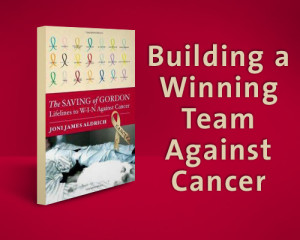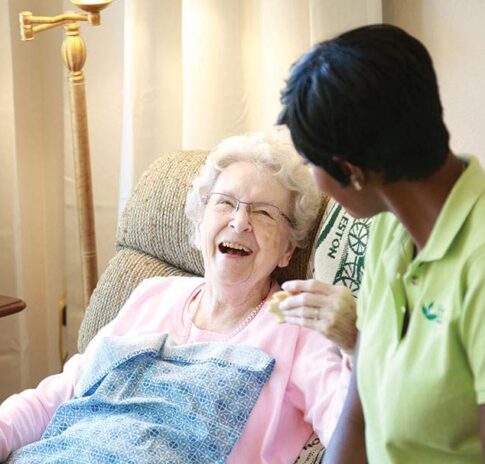 Today, we welcome our first guest post from caregiving expert, author and speaker, Joni Aldrich. Here is Joni’s advice on how to build a winning team against cancer:
Today, we welcome our first guest post from caregiving expert, author and speaker, Joni Aldrich. Here is Joni’s advice on how to build a winning team against cancer:
The reality is that 4,000 people are diagnosed with cancer every day in the United States. To put that in perspective, that’s the population of my hometown in North Carolina. When these patients and their families hear the words “you have cancer”, they feel exactly the way my husband, Gordon, and I did seven years ago. We didn’t know what to do. The Saving of Gordon: Lifelines to W-I-N Against Cancer contains the knowledge that I wanted on the day that Gordon was diagnosed. The book is full of best methods to fight any war against cancer.
Where do I recommend that families start when they hear those words that will change their life? They should focus on building a winning team. Chapter Eight in The Saving compares building a winning cancer team to building a winning football team. That may sound odd, but the building blocks are essentially the same.
“The way a team plays as a whole determines its success. You may have the greatest bunch of individual stars in the world, but if they don’t play together, the club won’t be worth a dime.”
—BABE RUTH
Good backers. The insurance companies are your backers. Health insurance is one of those variables that can be across the board from nonexistent to over-coverage. While you have to work somewhat within their confines, you also have to look out for your best interests. Find your assets within the insurance and health care system. If you don’t have health insurance, there are still options available to you.
An impressive stadium. This will be your treatment facility. A lot of cancer patients choose one close to home because it’s easier. If you built a stadium in a location that’s convenient and not because it’s the best location to get fans to the games, would you succeed? Mistakes in finding the right treatment center cost more than just valuable time and strength. Location, location, location!
The right equipment. Facilities have different medical equipment. There’s a big difference between a facility with a high annual caseload treating your type of cancer, and one that doesn’t treat many cases at all. If something goes wrong, the facility has to have the equipment and know how to deal with it quickly and efficiently.
A great coach and staff. This is your primary oncologist and his or her support staff, which will likely include several types of doctors. You may have a different oncologist for radiation, chemotherapy, and surgery. Your coach (primary oncologist) will design the “plays” to coordinate your cancer war. Confidence, experience, and success—these are critical factors to look for in your primary oncologist.
A good team. If you have carefully chosen the facility and oncologist, the rest of the team should be equally qualified. It will include physician assistants, nurses, medical techs, therapists, clinicians, pharmacists, and other highly trained individuals. Your comfort should be provided for throughout your treatments. An occasional stumble in service might occur (cancer centers are busy places!), but it shouldn’t be the daily normal.
Know your opponent. How aggressive is your opponent? What are their strengths and weaknesses? How well do you know everything there is to know about your cancer? Is it isolated, or has it spread? Are there new treatment options or clinical trials? Knowledge is the key to success for you and your team! Ask for copies of all medical test results.
A strategic playbook. This will be the cancer regimen that you and your oncologist decide on. It shouldn’t be wishy-washy or poorly defined. The playbook has to be flexible to accommodate the differences in the other team (the cancer) and what’s working offensively and defensively. The entire team has to understand the playbook.
Officials that are for your team. The officials in a cancer battle are the caregivers. Most cancer patients need a primary caregiver. They focus on the patient’s side, and may need to blow the whistle. They don’t actively take part in the game, but it couldn’t be played without them. The caregiver has to make certain that all details are covered with the medical staff. One detail that you may feel is insignificant could result in a turning point where you don’t want to go.
Fans to fill the stadium. Your fans will support you, lend you encouragement, and offer prayers. They will be there to give you a kind word or help at home. They make and receive calls, sometimes at odd hours. The support they give is available no matter where you are, or what you’re going through.
Understanding the goal. Make sure that your team understands the goal and what you expect from them. While each goal must be attainable, no one said that a low-ranked team couldn’t make it to the Super Bowl. It’s happened before. Work daily to make the impossible possible.
How important is a winning team? Even though Gordon’s first treatment facility and oncologist were part of a highly accredited teaching hospital, they didn’t know how to treat his type of cancer. Medical tests that were done—but not acknowledged—showed that Gordon’s cancer was very aggressive. After five months of standard treatment, the cancer was three times worse than before any treatment at all. We were suddenly thrust into an urgent life-or-death struggle to save Gordon. It was too late, and we lost him two years to the day after he was diagnosed.
About Joni’s cancer books (available at www.basketofcare.com):
The Saving of Gordon: Lifelines to W-I-N Against Cancer
Based on Joni’s experience and years of research, this inspirational and informative book is designed to give families a fighting chance in their own cancer battle.
Connecting through Compassion: Guidance for Family and Friends of a Brain Cancer Patient: When Gordon’s cancer metastasized to his brain, Joni needed advice on how to reconnect to her husband of 20 years. This book contains it—too late for Joni, but to help other families caring for a brain cancer patient.
